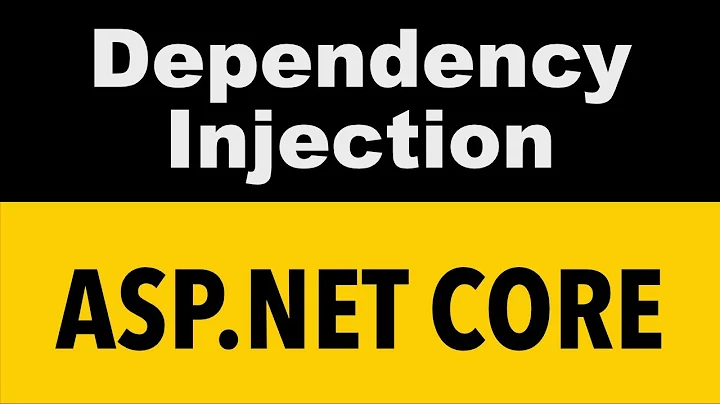ASP.NET Core DependencyResolver
Solution 1
Yes, there is. In ASP.NET Core 1.0.0, the services available within a request from HttpContext are exposed through the RequestServices collection[1]:
this.HttpContext.RequestServices
You can use the GetService method to retrieve the dependencies by specifying the type of the dependency:
this.HttpContext.RequestServices.GetService(typeof(ISomeService));
Generally, you shouldn’t use these properties directly, preferring instead to request the types your classes you require via your class’s constructor, and letting the framework inject these dependencies. This yields classes that are easier to test and are more loosely coupled.
[1] https://docs.asp.net/en/latest/fundamentals/dependency-injection.html#request-services
Solution 2
If you really need it, you can write own one. First - create AppDependencyResolver class.
public class AppDependencyResolver
{
private static AppDependencyResolver _resolver;
public static AppDependencyResolver Current
{
get
{
if (_resolver == null)
throw new Exception("AppDependencyResolver not initialized. You should initialize it in Startup class");
return _resolver;
}
}
public static void Init(IServiceProvider services)
{
_resolver = new AppDependencyResolver(services);
}
private readonly IServiceProvider _serviceProvider;
public object GetService(Type serviceType)
{
return _serviceProvider.GetService(serviceType);
}
public T GetService<T>()
{
return _serviceProvider.GetService<T>();
}
private AppDependencyResolver(IServiceProvider serviceProvider)
{
_serviceProvider = serviceProvider;
}
}
Please note that _serviceProvider.GetService<T>(); only available if you add using Microsoft.Extensions.DependencyInjection;. That namespace will be available if you add "Microsoft.Extensions.DependencyInjection": "1.0.0" to your project.json.
Than you should call Init method in your startup class. For example
public void Configure(IApplicationBuilder app, IHostingEnvironment env, ILoggerFactory loggerFactory)
{
AppDependencyResolver.Init(app.ApplicationServices);
//all other code
After that you can use it anywhere, same as DependencyResolver.Current. But my suggestion - use it only if no other choice left.
Solution 3
Here is the way that worked for me in .Net core 2.0
public ViewResult IndexWithServiceLocatorPattern([FromServices]ProductTotalizer totalizer)
{
var repository = (IRepository)HttpContext.RequestServices.GetService(typeof(IRepository));
ViewBag.HomeController = repository.ToString();
ViewBag.Totalizer = totalizer.repository.ToString();
return View("Index", repository.Products);
}
If I have to do it with classical way, It would be like below.
public class HomeController : Controller
{
private readonly IRepository repo;
/// <summary>
/// MVC receives an incoming request to an action method on the Home controller.
/// MVC asks the ASP.NET service provider component for a new instance of the HomeController class.
/// The service provider inspects the HomeController constructor and discovers that it has a dependency on the IRepository interface.
/// The service provider consults its mappings to find the implementation class it has been told to use for dependencies on the IRepository interface.
/// The service provider creates a new instance of the implementation class.
/// The service provider creates a new HomeController object, using the implementation object as a constructor argument.
/// The service provider returns the newly created HomeController object to MVC, which uses it to handle the incoming HTTP request.
/// </summary>
/// <param name="repo"></param>
public HomeController(IRepository repo)
{
this.repo = repo;
}
/// <summary>
/// Using Action Injection
/// MVC uses the service provider to get an instance of the ProductTotalizer class and provides it as an
/// argument when the Index action method is invoked.Using action injection is less common than standard
/// constructor injection, but it can be useful when you have a dependency on an object that is expensive to
/// create and that is required in only one of the action methods defined by a controller
/// </summary>
/// <param name="totalizer"></param>
/// <returns></returns>
public ViewResult Index([FromServices]ProductTotalizer totalizer)
{
ViewBag.Total = totalizer.repository.ToString();
ViewBag.HomeCotroller = repo.ToString();
return View(repo.Products);
}
}
Solution 4
Service available in Asp.net core, its within HttpContext
this.HttpContext.RequestServices
By using this service, it is possible to get service. and also you can use GetService method to retrieve the dependencies by specifying the type of the dependency:
this.HttpContext.RequestServices.GetService(typeof(ISomeService));
Solution 5
There are extension methods for IServiceProvider: GetService, GetRequiredService and GetServices. All have generic and non-generic versions. In Asp.Net Core web project you can obtain reference to IServiceProvider via DI or from IApplicationBuilder. In Console app you should create your own instance of IServiceProvider and store reference somewhere
var services = new ServiceCollection();
...
ServiceProvider = services.BuildServiceProvider();
Related videos on Youtube
analyser
Updated on July 09, 2022Comments
-
analyser almost 2 years
In ASP.NET MVC 5 is possible to obtain some dependency through
DependencyResolver.Current.GetService<T>(). Is there something similar in ASP.NET Core?-
Steven almost 8 yearsThe
DependencyResolver.Currenthas been replaced with theIServiceProviderabstraction. -
analyser almost 8 yearsOK. But is there something like ServiceProvider.Current.GetService<T>()? I want to be able to obtain a service without the need to inject it.
-
Steven almost 8 yearsThere isn't, and that's actually a good thing. What you are trying to do is a bad practice.
-
-
Vitaly almost 8 yearsIt was removed in RC2 github.com/aspnet/Announcements/issues/118
-
Sergio Vicente almost 8 yearsCorrect, it was made available on ASP.NET Core 1.0.0. I should have mentioned the version in the reply to make it clearer. Thank you for pointing it out.
-
 Jeroen van Langen over 3 yearsOne of the major things about Dependency injection is avoid using static (singleton) instances.
Jeroen van Langen over 3 yearsOne of the major things about Dependency injection is avoid using static (singleton) instances. -
YuriyP over 2 yearsAs I said, use it only if no other choice left. If you can inject it in controller or filter - it is better choise. If you need some background task it is better to create new scope and use it to resolve dependency. But sometimes in legacy code you need to resolve some singeleton service and you have no time to rewrite such code - this method may be used.
-
 ruffin about 2 years"If you really need it" -- how are you mocking tests that might require DI without it?
ruffin about 2 years"If you really need it" -- how are you mocking tests that might require DI without it?











